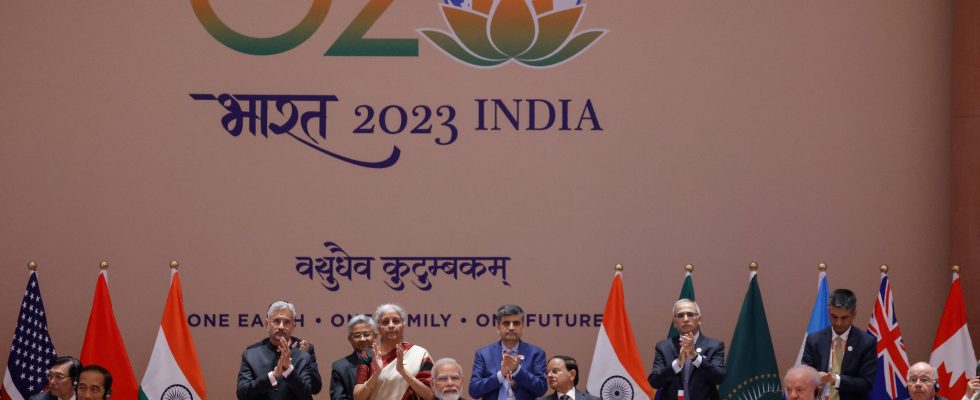The curtain closed. Indian Prime Minister Narendra Modi concluded a G20 summit this Sunday, September 10, with more than mixed results. It was described as a success by Russia and Brazil, in particular, which will host the next edition in Rio de Janeiro, but considered disappointing by some Westerners on several points, such as the climate or the war in Ukraine.
The war in Ukraine
According to a message on X (formerly Twitter) from Indian official Amitabh Kant, one of the summit’s key organizers, the compromise text on Ukraine in the final declaration required “more than 200 hours of non-stop negotiations, 300 bilateral meetings (and) 15 draft texts. Amitabh Kant underlined the role played by Brazil, among others, in the elaboration of this compromise.
“We cannot let geopolitical issues block the agenda of the G20 discussions,” argued Brazilian President Luiz Inacio Lula da Silva during the last session of the summit, which he described as “successful”. “We have no interest in the G20 being divided. We need peace and cooperation instead of conflict,” he added.
The summit’s final declaration denounces the “use of force” aimed at achieving territorial gains in Ukraine. But it does not explicitly mention Russian “aggression”, an expression nevertheless used in 2022 at the previous G20 summit in Bali, with reference to a UN resolution. She deplored “in the strongest terms the aggression committed by the Russian Federation against Ukraine.”
If Kiev had affirmed on Saturday, through the voice of a spokesperson for its Foreign Ministry, that “the G20 has nothing to be proud of”, the head of Russian diplomacy, Sergey Lavrov, has for his share estimated this Sunday that “the summit is undoubtedly a success”. “We were able to thwart attempts by the West to ‘Ukrainize’ the summit agenda,” he said, as he led the Russian delegation in the absence of President Vladimir Putin. “The text does not mention Russia at all.”
Brazilian President Lula has also said that Vladimir Putin will not be arrested if he goes to the next G20 summit organized next year in Rio de Janeiro.
“Insufficient” on the climate
Beyond Ukraine, the G20 countries are also divided on the future of oil. With 2023 on track to be the hottest year on record for humanity, the final declaration failed to call for a fossil fuel exit. Even if it supports for the first time the objective of tripling renewable energies by 2030. “It is insufficient”, recognized French President Emmanuel Macron, who “alert everyone” on the need to set more ambitious objectives, in particular on the exit from oil. “And I am for my part very concerned about the spirit which is beginning to reign, including moreover within the members of the G20, on the question of the climate”, he added to the press, unless three months before COP28.
The French president called for “getting out very quickly and much faster than today from coal”, from “2030”, but also “as quickly as possible from oil”, “well before 2050″. The richest countries must make the effort, we are doing it, it costs us […] but we do it, it is legitimate and normal”, he estimated, while asking emerging countries, in particular oil producers, to now also do their part.
Entry of the African Union
African leaders on Saturday welcomed the entry of the African Union (AU) into the G20. A place in the group of largest developed and emerging economies which offers, according to them, a “voice” to the continent. South Africa was until now the only African country represented. This decision is thus interpreted as a strong signal for the continent.
Established in the Ethiopian capital Addis Ababa, the pan-African organization has 55 members (including six suspended), totaling three trillion dollars in GDP. “We are pleased that the AU, which represents the fastest growing continent, will secure a seat in the G20. This will give African interests and perspectives a voice and visibility in this important body,” he said. in a press release the Kenyan President, William Ruto.
Jinping and Putin, notable absences
Neither Russian President Vladimir Putin nor his Chinese counterpart Xi Jinping attended the New Delhi summit. Kremlin spokesperson Dmitri Peskov rejected the idea of an intervention by videoconference by the Russian president on Thursday. “All the work will be done by the Minister of Foreign Affairs,” Sergei Lavrov, he said. For the second consecutive year, Vladimir Putin did not respond positively to the invitation to represent Russia during the meeting.
The absence of Xi Jinping was also strongly noted. Especially since he is missing the summit for the second time, because his “zero Covid” policy had already prevented him from going abroad. “This is the most resounding absence from the summit,” wrote the editorialist of The Indian ExpressShubhajit Roy. “The non-participation of the most senior leader of the second largest economy in the world’s main economic forum is fraught with meaning,” he added.
Why such an absence? Several hypotheses are mentioned, including the fact that the G20 summit is less important to him. “It seeks to create an alternative to the existing liberal, US-dominated international order, a China-centric order with broad support from the South,” summed up in L’Express Steve Tsang, director of the institute. SOAS China, at the University of London. Hence the importance of the Brics in relation to the G20.
